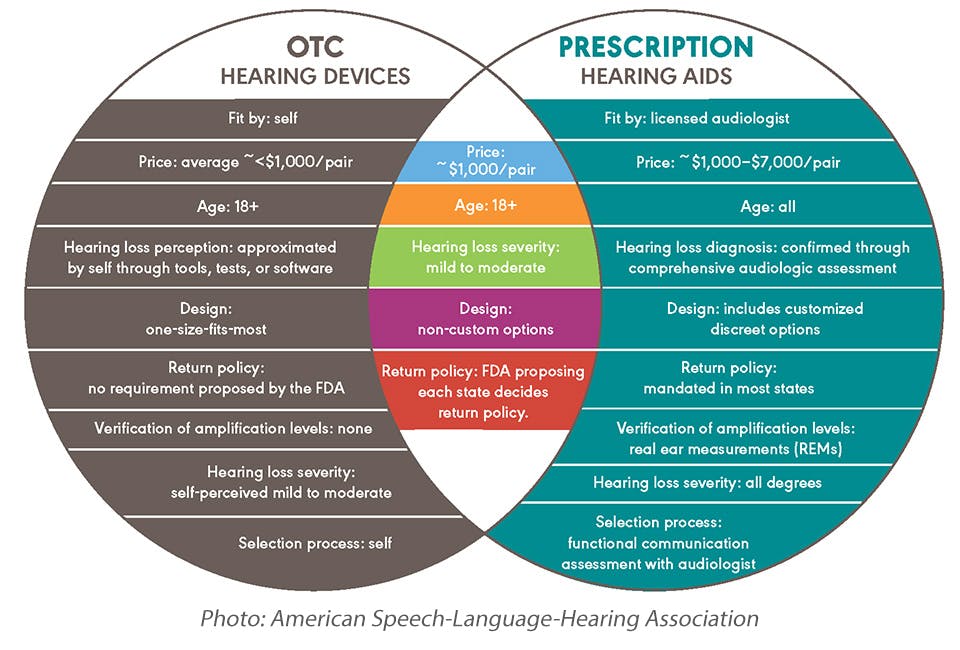Over-the-counter hearing aids may seem like a viable alternative to prescription devices, but it’s important to understand their differences before making a purchase.
Hearing Loss Severity
OTC hearing aids: Because they’re more like personal amplification devices, OTC hearing aids are designed to address mild to moderate hearing loss. OTC devices are not intended for people younger than 18.
Prescription hearing aids: These hearing devices treat mild to profound hearing loss depending on the style and programming. They can be prescribed for all ages, from infants to seniors.
Design
OTC hearing aids: OTC devices are designed as one-size-fits-all devices. Programming is usually limited to amplification, but all sounds are increased, including background noise.
Prescription hearing aids: One of the advantages of prescription hearing aids is the wide selection of devices designed to suit different types of hearing loss. Your audiologist will help you select the right design based on the degree and cause of your hearing loss.
Prescription hearing aids are available in the following styles:
- Invisible-in-the-canal
- Completely-in-the-canal
- Mic-in-helix
- In-the-canal
- In-the-ear half shell and full shell
- Receiver-in-the-ear
- Behind-the-ear
- Bone-anchored hearing aids
Hearing Aid Cost
OTC hearing aids: These devices are usually less expensive than traditionally acquired hearing aids. OTC devices can cost up to $1,000, depending on the manufacturer and programming. Most OTC hearing aids don’t have a return policy, so you can’t exchange them if they don’t meet your needs.
Prescription hearing aids: You may spend several thousand dollars on prescription hearing aids due to their high-quality programming, durability and additional features such as Bluetooth connectivity and health monitoring.
Acquiring Your Devices
OTC hearing aids: You determine the selection process when purchasing OTC hearing aids. You may take an online hearing test to evaluate your degree of hearing loss, but you’re not required to do so before purchasing these devices. OTC hearing aids are available at most drugstores and big-box stores and online. There is no trial period, and the store staff usually lacks experience in addressing questions and adjustments.
Prescription hearing aids: You must go to an audiologist for a comprehensive hearing evaluation and physical exam before you receive prescription hearing aids. Your audiologist will review your test results and medical history to determine the cause of your hearing loss and which part of your ear is affected. They will discuss which hearing aid style is best for your needs and order your devices.
Adjustments and Customization
OTC hearing aids: These devices are limited in their capabilities and don’t come with many customization options other than volume amplification.
Prescription hearing aids: You can purchase prescription hearing aids with various advanced features such as hands-free calling, audio streaming and programming that automatically adjusts to your listening environment. These devices can be programmed to filter background noise, and some have directional mics that improve speech clarity. Prescription hearing aids regulate volume, feedback, wind noise and other audio features. Modern hearing aids are compatible with hearing aid accessories, including microphones, TV streamers and telecoil programs to optimize your listening experience.
Contact Hearing Associates if you’re considering purchasing prescription hearing aids. Our audiologists will help you find the right devices to suit your hearing needs. Call 888-760-2032 to schedule your appointment.


